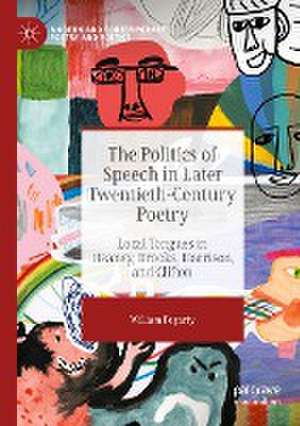The Politics of Speech in Later Twentieth-Century Poetry: Local Tongues in Heaney, Brooks, Harrison, and Clifton: Modern and Contemporary Poetry and Poetics
Autor William Fogartyen Limba Engleză Paperback – aug 2023
| Toate formatele și edițiile | Preț | Express |
|---|---|---|
| Paperback (1) | 771.80 lei 6-8 săpt. | |
| Springer International Publishing – aug 2023 | 771.80 lei 6-8 săpt. | |
| Hardback (1) | 776.97 lei 6-8 săpt. | |
| Springer International Publishing – 31 iul 2022 | 776.97 lei 6-8 săpt. |
Din seria Modern and Contemporary Poetry and Poetics
- 17%
 Preț: 360.93 lei
Preț: 360.93 lei -
 Preț: 382.22 lei
Preț: 382.22 lei - 15%
 Preț: 583.38 lei
Preț: 583.38 lei - 15%
 Preț: 682.99 lei
Preț: 682.99 lei -
 Preț: 386.46 lei
Preț: 386.46 lei -
 Preț: 376.34 lei
Preț: 376.34 lei -
 Preț: 383.55 lei
Preț: 383.55 lei -
 Preț: 387.40 lei
Preț: 387.40 lei - 18%
 Preț: 772.17 lei
Preț: 772.17 lei - 15%
 Preț: 574.10 lei
Preț: 574.10 lei -
 Preț: 377.84 lei
Preț: 377.84 lei - 15%
 Preț: 492.01 lei
Preț: 492.01 lei -
 Preț: 383.99 lei
Preț: 383.99 lei -
 Preț: 476.16 lei
Preț: 476.16 lei -
 Preț: 382.04 lei
Preț: 382.04 lei - 8%
 Preț: 422.80 lei
Preț: 422.80 lei -
 Preț: 379.75 lei
Preț: 379.75 lei -
 Preț: 377.30 lei
Preț: 377.30 lei -
 Preț: 375.80 lei
Preț: 375.80 lei -
 Preț: 380.89 lei
Preț: 380.89 lei - 15%
 Preț: 574.27 lei
Preț: 574.27 lei - 15%
 Preț: 575.56 lei
Preț: 575.56 lei - 15%
 Preț: 573.96 lei
Preț: 573.96 lei - 15%
 Preț: 574.60 lei
Preț: 574.60 lei -
 Preț: 383.01 lei
Preț: 383.01 lei -
 Preț: 384.91 lei
Preț: 384.91 lei -
 Preț: 380.89 lei
Preț: 380.89 lei - 15%
 Preț: 574.27 lei
Preț: 574.27 lei -
 Preț: 376.55 lei
Preț: 376.55 lei -
 Preț: 380.89 lei
Preț: 380.89 lei -
 Preț: 451.58 lei
Preț: 451.58 lei -
 Preț: 374.46 lei
Preț: 374.46 lei - 18%
 Preț: 722.43 lei
Preț: 722.43 lei -
 Preț: 384.36 lei
Preț: 384.36 lei
Preț: 771.80 lei
Preț vechi: 941.22 lei
-18% Nou
Puncte Express: 1158
Preț estimativ în valută:
147.75€ • 151.95$ • 122.58£
147.75€ • 151.95$ • 122.58£
Carte tipărită la comandă
Livrare economică 19 februarie-05 martie
Preluare comenzi: 021 569.72.76
Specificații
ISBN-13: 9783031078910
ISBN-10: 3031078918
Pagini: 247
Ilustrații: XI, 247 p. 3 illus.
Dimensiuni: 148 x 210 mm
Greutate: 0.31 kg
Ediția:1st ed. 2022
Editura: Springer International Publishing
Colecția Palgrave Macmillan
Seria Modern and Contemporary Poetry and Poetics
Locul publicării:Cham, Switzerland
ISBN-10: 3031078918
Pagini: 247
Ilustrații: XI, 247 p. 3 illus.
Dimensiuni: 148 x 210 mm
Greutate: 0.31 kg
Ediția:1st ed. 2022
Editura: Springer International Publishing
Colecția Palgrave Macmillan
Seria Modern and Contemporary Poetry and Poetics
Locul publicării:Cham, Switzerland
Cuprins
Chapter 1: Introduction: Local Tongues.- Chapter 2: Troubled Tongues: Seamus Heaney and the Political Poetics of Speech.- Chapter 3: The Gwendolynian Tongue: Gwendolyn Brooks’s Noncolloquial Local Speech.- Chapter 4: Tongue-Tied Fighting: Tony Harrison’s Linguistic Divisions.- Chapter 5: Mortal Tongues: Lucille Clifton’s Local-Speech Admonitions.- Chapter 6: Coda: The Twenty-First Century Local-Speech Poem.
Recenzii
“Fogarty’s book relies on poems to help us explore the political tensions that animate everyday language. … The poems he chooses illuminate acutely political situations in ways that would challenge other kinds of expression. The Politics of Speech makes its case with an enviable dexterity of style and an easy reference to a large corpus of scholarship. There is, in addition, a rare and beautiful humanity that accompanies the scholarly humility, which is not a pose but an earnest trust in poetry” (Walt Hunter, Modern Philology, December 18, 2023)
Notă biografică
William Fogarty is Assistant Professor of English at the University of Central Florida, USA.
Textul de pe ultima copertă
The Politics of Speech in Later Twentieth-Century Poetry: Local Tongues in Heaney, Brooks, Harrison, and Clifton argues that local speech became a central facet of English-language poetry in the second half of the twentieth century. It is based on a key observation about four major poets from both sides of the Atlantic: Seamus Heaney, Gwendolyn Brooks, Tony Harrison, and Lucille Clifton all respond to societal crises by arranging, reproducing, and reconceiving their particular versions of local speech in poetic form. The book’s overarching claim is that “local tongues” in poetry have the capacity to bridge aesthetic and sociopolitical realms because nonstandard local speech declares its distinction from the status quo and binds people who have been subordinated by hierarchical social conditions, while harnessing those versions of speech into poetic structures can actively counter the very hierarchies that would degrade those languages. The diverse local tongues of these four poets marshaled into the forms of poetry situate them at once in literary tradition, in local contexts, and in prevailing social constructs.
Caracteristici
Focuses on four major poets and their widely anthologized poems Argues that local speech is an elemental transnational facet of twentieth-century poetry Situates poems in literary tradition, in local contexts, and in prevailing social constructs
